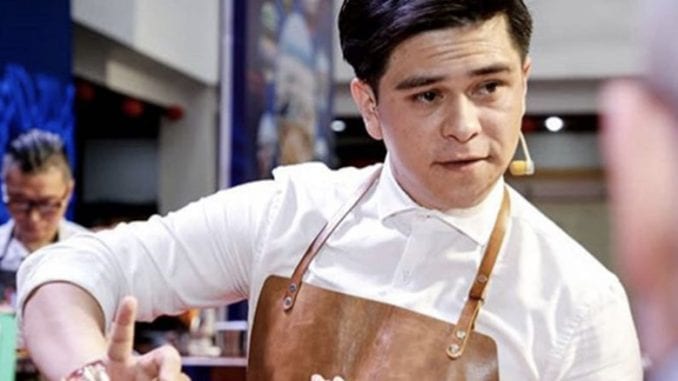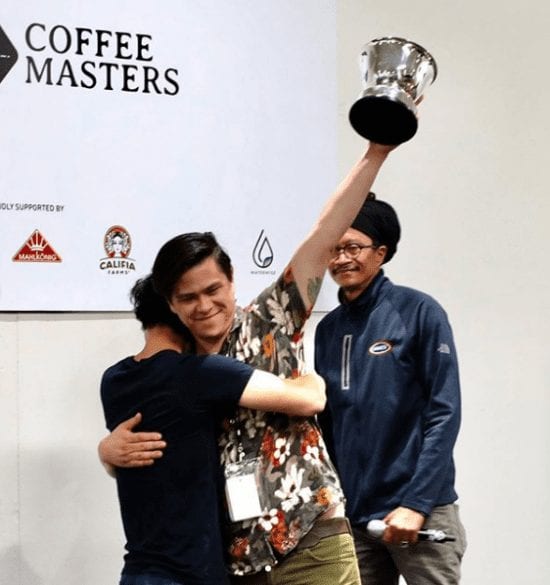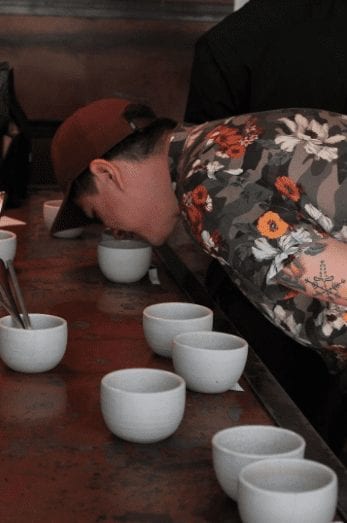
We finish our interview with 2019 Coffee Masters winner Carlos de la Torre, en inglés y español.
BY KATRINA YENTCH
BARISTA MAGAZINE ONLINE
Cover photo by Fushan Cup International Barista Championship
Note from the editor: I conducted this interview in Spanish. It has been translated by me and revised for clarity by Marisol Samayoa.
Italics = Spanish translation
From the editor: Yesterday, we began our interview with the winner of Coffee Masters this year Carlos de la Torre, barista and owner of Café Avellaneda and the roaster Café con Jiribilla. Today we finish the discussion, talking about his winning drink and his favorite part of owning a café.
Del editor: Ayer, empezamos nuestra entrevista con el ganador de Coffee Masters este año, barista y el dueño de Café Avellaneda y el tostador Café con Jiribilla, Carlos de la Torre. Hoy, terminamos la discusión sobre su bebida ganadora y su parte favorito de tener un cafetería.
How did you come up with your drink for Coffee Masters? // Que era tu inspiración para tu bebida en Coffee Masters este año?
It’s a long story, but it had changed the moment I served it. It started as a version of “The Juanito,” a beverage I made some years ago. It was inspired by the “second opportunities” made with things that you can find in any refrigerator after a party. We were looking for another option of what to do with espressos left on the bar when we use only one of the shots. In this situation, we converted it into a version with alcohol, with a Mexican coffee that made a good harmony with the sensory profile of the rest of the ingredients and mixed with Sotol, a distilled liquor from Chihuahua that reinforces the identity of a drink representing the Mexican community in Los Angeles.
Es una historia larga pues cambió hasta el momento en que la serví. Comenzó siendo una versión de el “Juanito”, una bebida que hice hace unos años y está inspirada en las “segundas oportunidades” hecha con cosas que se pueden encontrar en cualquier refrigerador después de una fiesta y con ella buscamos darle una segunda oportunidad a los espressos que a veces nos sobran en la barra cuando solo usamos uno de los dos shots. En esta ocasión la convertí en una versión con alcohol, con un café mexicano que hiciera buena armonía con el perfil sensorial de los demás ingredientes y mezclándolo con Sotol, un destilado de Chihuahua que reforzara la identidad de la bebida representando la comunidad mexicana en Los Angeles.

It turned into a drink that later in the competition represented my country and its presence in L.A., to have Mexican coffee, fruit, and liquors. It’s intriguing that all these ingredients had to cross the border by land, and when we open them there in this context at the moment of preparing them, we also invoke the second opportunities that migrants look for—not just Mexicans but all Latin Americans in the States, rounding out the original concept in this drink and giving much more meaning to represent a larger community.
Se tornó una bebida que entonces en la competencia representaría a mi país y su presencia en L.A. al tener café, fruta y destilado mexicanos. Lo curioso es que todos los ingredientes se tuvieron que cruzar por la frontera vía terrestre y al abrirlos allá en ese contexto al momento de prepararlos nos evocó también las segundas oportunidades que buscan los migrantes no solo mexicanos sino latinoamericanos en Estados Unidos redondeando el concepto original en esa bebida y dando mucho más sentido al representar una comunidad más grande.

You also competed at the World Barista Championship this year. Was it stressful to compete in two competitions in the same year? // Además, tu competiste en World Barista Championship este año, tuviste mucho estrés?
The most stress, haha, but it’s also fun, emotional, and enriching to compete constantly. Did I prepare with the same things for Coffee Masters? No, it’s a very distinct competition. I didn’t have much time to prepare, but fortunately many of the disciplines could strengthen with the work that I do every day in the job.
Muchísimo estrés haha, pero es también divertido, emocionante y enriquecedor competir constantemente. Preparaste con las cosas mismas para Coffee Masters? No, es una competencia muy distinta, no tuve mucho tiempo para prepararme pero por fortuna muchas de las disciplinas las pude fortalecer con el trabajo que hago todos los días en el trabajo.
And finally, what is the best and worst part of owning a café for you? // Y fin, que es el mejor y lo peor partes de tener una cafetería?
The best part is doing what I love to do for a living and giving the opportunity to others that also do it. The worst … nothing can be considered too bad when you have the satisfaction of giving people coffee, although sometimes it’s stressful when there’s an operational problem and you are far away in a competition or on a trip to origin.
La mejor parte es hacer lo que me gusta para vivir y poder dar la oportunidad a otros de que también lo hagan. Lo peor … nada es tan malo que no valga la pena por toda la satisfacción que da el café, aunque a veces es estresante cuando hay algún problema operativo y tú estás lejos en una competencia o en un viaje a origen.

